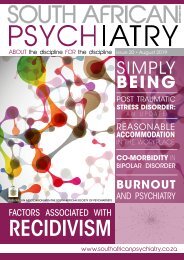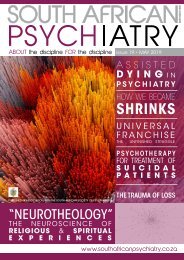South African Psychiatry - November 2018
South African Psychiatry - November 2018
South African Psychiatry - November 2018
Create successful ePaper yourself
Turn your PDF publications into a flip-book with our unique Google optimized e-Paper software.
POLICY GUIDELINE<br />
or institution-based mental health care,<br />
admission under the MHCA surely does not<br />
apply. Rather, if a person suffers a relapse of<br />
their mental illness, the proprietor/ manager<br />
would apply to a hospital for an assisted or<br />
involuntary admission if the person lacks the<br />
capacity to consent and their relatives are<br />
not available.<br />
b. the proprietor/ manager to take responsibility<br />
for access to and provision of mental health<br />
care appropriate to the level of severity of<br />
the illness (15.6, 15.7, 17.7, 17.8, 17.9, 18.1,<br />
18.2).<br />
Access to general and mental health care<br />
of PLWMI and/or ID appropriate to the<br />
level of severity of the illness, in equity with<br />
the provision of general health care, is the<br />
responsibility of the Department of Health.<br />
The NGO proprietor/ manager’s responsibility<br />
is to ensure that the NGO residents utilise<br />
the accessible mental health care services<br />
provided by the DOH.<br />
c. facilities to have a medical procedure room<br />
(16.7), sluice rooms (Annexure B, page 9)<br />
and registers for restraints and medicine<br />
dispensing (Annexure B page 20).<br />
The NGOs to which the guidelines are<br />
applicable serve a predominantly social<br />
role. Therefore, while they require a ‘first-aid’<br />
room and an area to administer injections,<br />
they do not dispense medication, perform<br />
medical procedures, or use restraints.<br />
6. There is a lack of clarity regarding financial,<br />
asset and human resource governance, apart<br />
from stating that the NGOs are funded by<br />
either or both Departments of Health or Social<br />
Development (2.3). In Annexure B pages 21<br />
and 22, the relationship be between the ‘service<br />
provider’, NGO manager, NGO Board, and the<br />
Departments of Health and Social Development<br />
is not clear. There is no clause requiring evidence<br />
of self-sustainability without a DOH subsidy as a<br />
requirement for licensing.<br />
7. The Policy Guidelines do not address the need<br />
for guardianship or custodial care of PLWMI<br />
and/or ID who do not have any relatives, or who<br />
are housed in NGOs at the request of social<br />
workers or the police because of abusive family<br />
homes or homelessness.<br />
8. There is no guidance regarding intersectoral<br />
responsibilities for the care, monitoring or<br />
adjudication of the facilities.<br />
OUR RECOMMENDATIONS ARE:<br />
1. Guidelines must distinguish between the<br />
different levels and types of care which NGOs<br />
may provide, acknowledging the wide range<br />
of individual need and the intersectoral nature<br />
of community-based services. They should<br />
be informed by the principles of the recovery<br />
model and inclusive development embodied<br />
in existing policy and legislation. Specific areas<br />
of overlap, for example with ECD centres and<br />
homeless shelters, should be addressed.<br />
The role of the NGO administered facilities to<br />
which these Guidelines are applied should not<br />
be conflated with that of designated health<br />
establishments:<br />
a. If there is a need for NGOs to provide certain<br />
health functions with the support of civil<br />
society, this must be delineated accordingly.<br />
Clear criteria for authorisation of individual<br />
NGOs to perform specified tasks is needed.<br />
b. Where the Department of Health needs<br />
an NGO to function fully as a health<br />
establishment, it should be designated and<br />
funded as such.<br />
2. There is a need for guardianship or custodial<br />
care arrangements in the case of homeless or<br />
previously abused PLWSMI and/or ID. Access to<br />
legal assistance and intersectoral arrangements<br />
between at least the Departments of Health, Social<br />
Development and Justice are required. These<br />
processes should be covered in the guidelines.<br />
3. Adequate financial support and sound<br />
governance are essential to the observance of<br />
basic human rights of NGO residents.<br />
a. Clearer guidelines on the financial<br />
management by the facility and its Board, and<br />
their relationship with the funder(s) is required.<br />
b. The amendment of Regulation 6, Government<br />
Gazette No. 38182 of 6 <strong>November</strong> 2014,<br />
added “Within available resources” to<br />
the State’s obligation to pay subsidies to<br />
appropriate non-profit organisations for<br />
the provision of community care, treatment<br />
and rehabilitation. Clarification as to the<br />
State and civil society’s respective financial<br />
obligations is essential.<br />
FINALLY, THERE IS NO ACKNOWLEDGEMENT<br />
BY THE NDOH OF THEIR INTER-DEPENDENCE<br />
WITH OTHER GOVERNMENT DEPARTMENTS,<br />
NGOS, CIVIL SOCIETY, USERS, AND THEIR<br />
FAMILIES, FOR THE CARE OF PLWSMI<br />
AND/OR ID. IF THE HUMAN RIGHTS OF<br />
SUCH VULNERABLE AND MARGINALISED<br />
PEOPLE ARE TO BE OBSERVED, IT IS VITAL<br />
THAT ALL ORGANISATIONS INVOLVED IN<br />
THEIR WELL-BEING WORK TOGETHER IN A<br />
COLLABORATIVE MANNER.<br />
We trust that the Policy Guidelines will be revised<br />
accordingly, and that the subsequent drafting of<br />
regulations will be accompanied by a thorough<br />
consultative process with all relevant stakeholders<br />
88 * SOUTH AFRICAN PSYCHIATRY ISSUE 17 <strong>2018</strong>

















